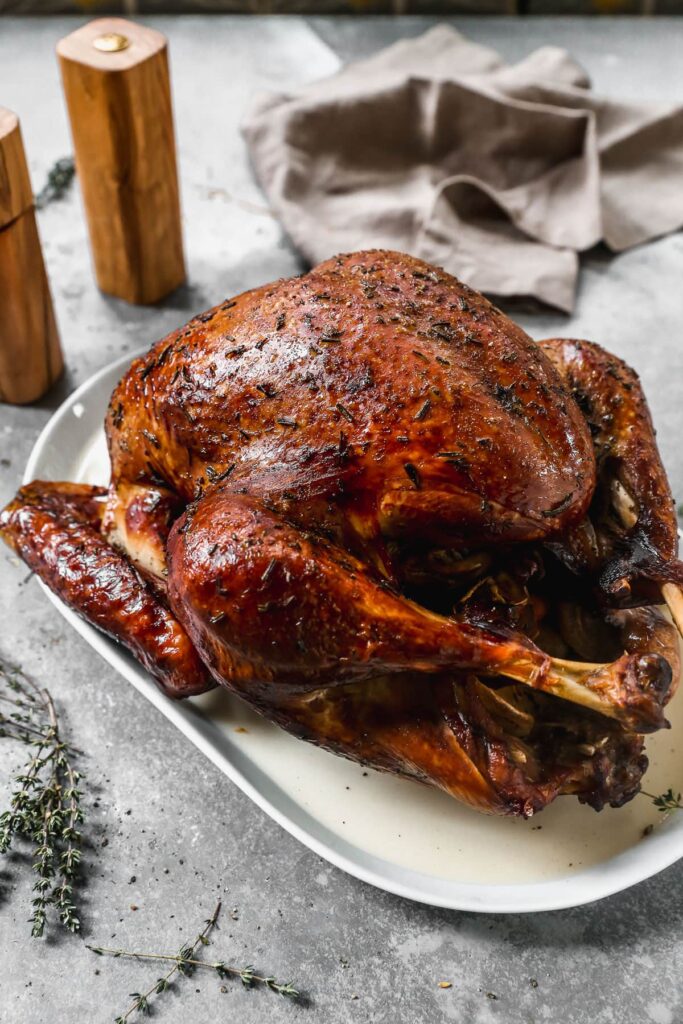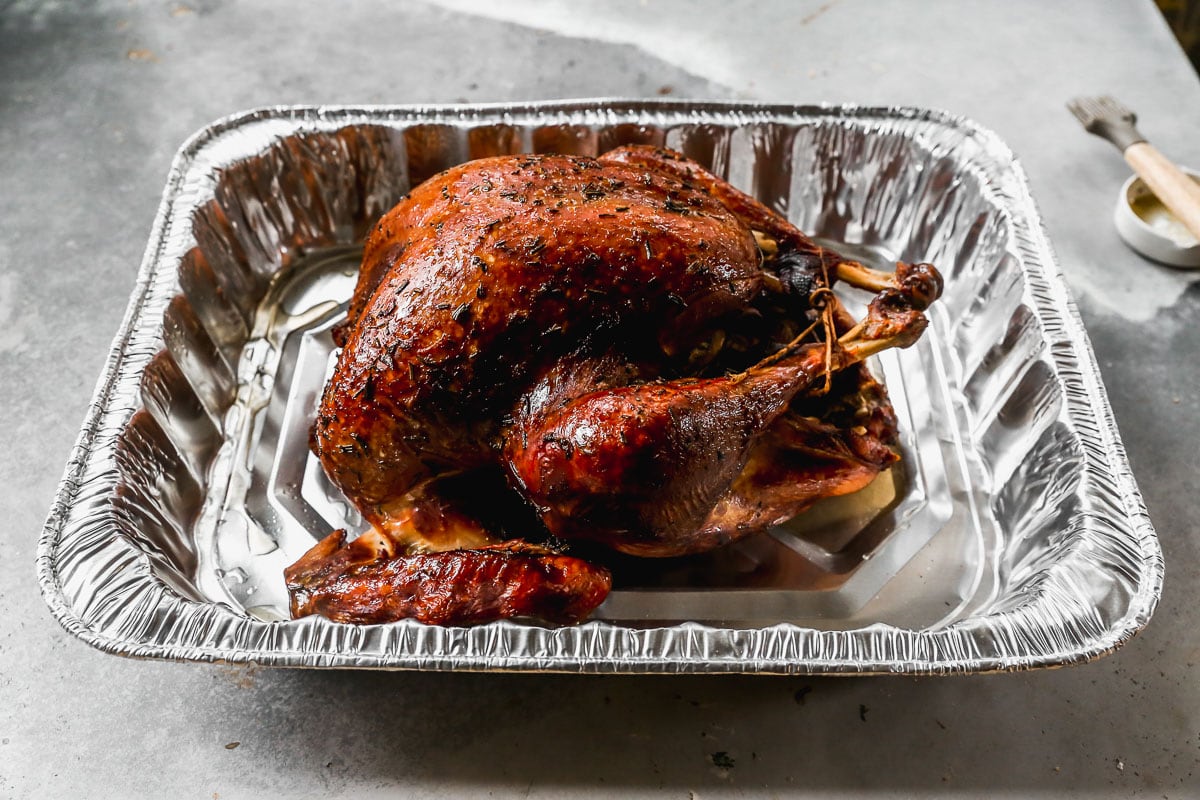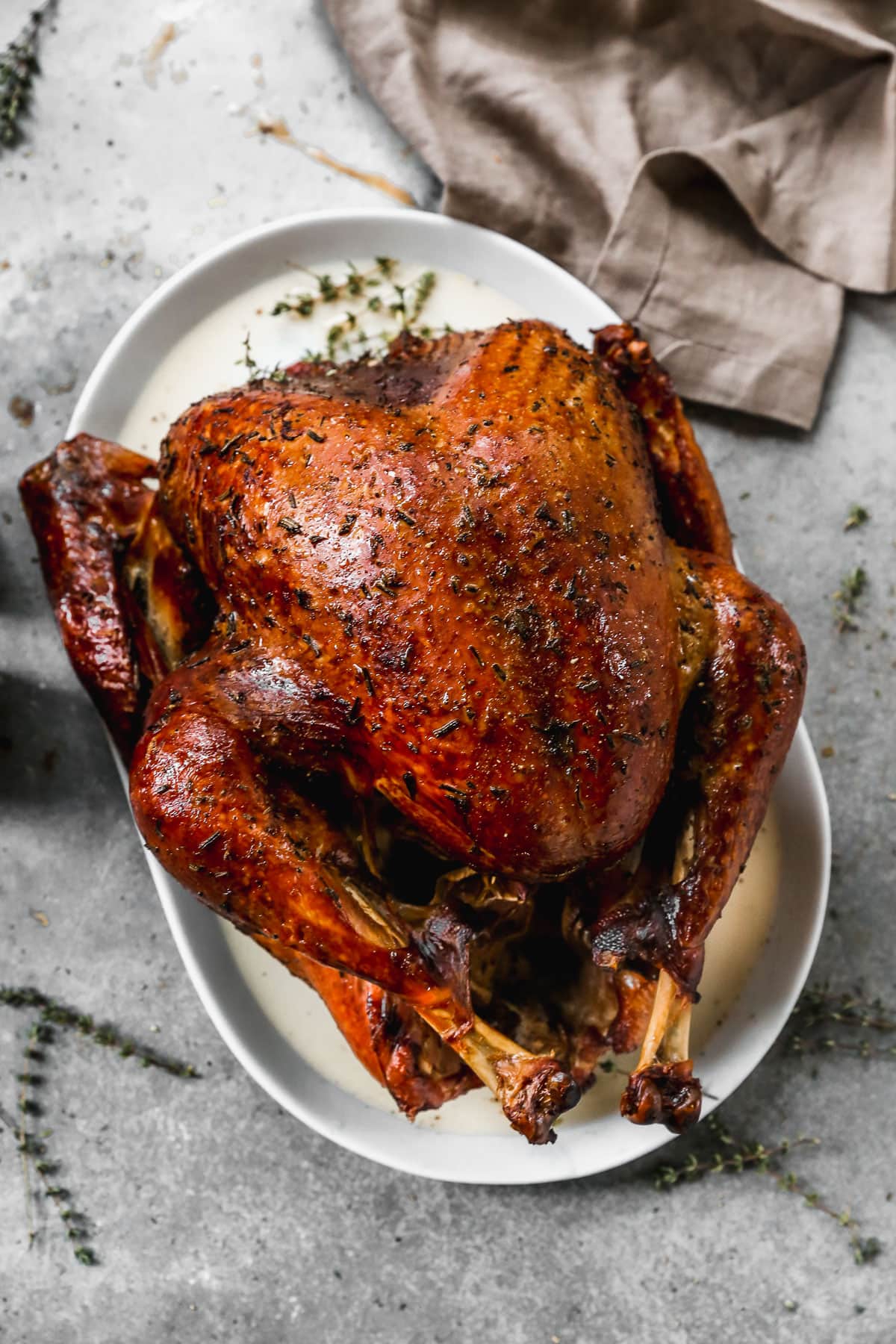Smoked Turkey – WellPlated.com

[ad_1]
Impress your guests with Smoked Turkey this Thanksgiving! It’s tender and juicy thanks to an herbaceous, citrusy brine, and that smoked flavor makes it unforgettable. Best! Turkey! Ever!

Email Me the Recipe!
Enter your email below to save this recipe to your free Well Plated recipe box.
From time to time, we’ll send you the best of Well Plated. Already registered? Log in here.
Why You’ll Love This Smoked Thanksgiving Turkey Recipe
- Turkey Is Made for Smoking. The smoker keeps turkey moist and infuses the meat with flavor. If dry, bland turkey has rained on your Thanksgiving parade year after year, it’s time to try smoking it! (I’m also partial to Smoked Salmon and Smoked Chicken Thighs.)
- It Frees Up Your Oven. While we love a traditional Roast Turkey and Spatchcock Turkey, if you have a single oven, managing Thanksgiving dinner is like the worst game of Tetris you’ve ever played. Solution? Smoked turkey, of course!
- Easier Than You Think. Unless you’re making Air Fryer Turkey Breast or Crockpot Turkey Breast, there’s really no easy way to do Thanksgiving turkey, but the smoker isn’t as hard as you might expect—especially if you’ve made other smoker recipes like Smoked Chicken Breast and Smoked Pork Tenderloin.
- Traditional With a Slight Twist. While the smoking part might not be traditional, the rest of this turkey recipe is exactly what you expect in a Thanksgiving roast—the aromatics stuffed in the cavity for flavor, the butter rubbed all over the exterior, and the leftovers for making turkey sandwiches on Homemade Dinner Rolls for lunch the next day.

How to Make the Best Smoked Turkey
The Ingredients
- Turkey. I recommend buying a fresh turkey from a local butcher—no thawing and you’re supporting a small business. Win-win! If you do buy a frozen turkey, you’ll need to thaw it before smoking. Not sure how big your turkey should be? Start here: How Much Turkey Per Person.
- Dry Brine. Using dry brine helps the turkey retain its juices, resulting in perfect, succulent meat. You can use a wet brine if you prefer, but I strongly recommend using dry for this smoked turkey recipe; you’ll get crispier skin too.
- Aromatics. Carrots, red apple, yellow onion, lemon, garlic, and fresh thyme infuse the turkey with flavor as it smokes. Feel free to toss in other herbs like fresh rosemary or sage.
- Unsalted Butter. It’s important to use unsalted butter since there’s already salt in the brine.
- Freshly Ground Black Pepper. Coarse black pepper adds big flavor to smoked turkey.
- Liquid. Apple juice, white wine, or chicken broth.
The Directions

- Brine the Turkey (1-3 Days Before Smoking). Pat the turkey dry, rub the dry brine all over the bird, including in the cavity, then refrigerate for 24 to 48 hours.
- Uncover (24 Hours Before Smoking). Uncover the turkey, then return it to the refrigerator. This helps the skin dry out so it can crisp.
- Bring to Room Temperature (1 Hour Before Smoking). Remove the turkey from the refrigerator and let it stand at room temperature.

- Prepare the Aromatics. You don’t need to peel a thing.

- Stuff the Turkey. Whatever doesn’t fit inside the turkey, scatter in the roasting pan.

- Tuck the Wings. This prevents them from burning.

- Tie. Use kitchen twine to tie the legs together.

- Get Ready for Smoking. Once your smoker is 325°F, brush the bird with the melted butter and set the pan on the smoker. Pour in your liquid.

- Smoke the Turkey. Cover the smoker and smoke your turkey at 325°F until it reaches 155°F in the breast and 160°F in the thighs.
- Rest and Carve. 20 to 30 minutes rest is mandatory or your turkey will be dry. Carve (see: How to Carve a Turkey) and ENJOY!

How Long Will It Take to Smoke a Turkey?
- You’ll need to smoke a whole turkey for 10 to 12 minutes per pound.
- This means a 12- to 14-pound turkey will need 2 to 3 hours smoking time.
Instead of following the clock, the BEST way to know when your smoked turkey is done is by temperature.
- The thigh should register at least 160°F and up to 180°F; the breast should be at least 150°F (and no more than 165°F) on an instant read thermometer inserted in the thickest part of the meat.
- The thermometer should not touch the bone or the turkey cavity.
- Per FDA guidelines, turkey is considered cooked at 165 degrees F, but its temperature will rise as it rests. See my post on How Long to Cook a Turkey for more information.

A Note About Smoked Turkey Gravy
Some people love smoked turkey gravy; other people find the smoky flavor to be much too strong. If you’ve never had it before, you may want to make Vegan Gravy or Mushroom Gravy for backup.
To make smoked turkey gravy, use my Turkey Gravy recipe with the drippings in the pan. Here are a few tips:
- If there are charred and burnt bits in the pan, do not scrape them off to include with the drippings. There’s already enough smoky flavor in the drippings and those charred-on bits will make it too strong.
- You may need to refill the pan with water during the smoking process. Do not refill it with broth, wine, or apple juice; just use water. This will reconstitute the original liquid and keep your gravy from being too strong.

What to Serve with Smoked Turkey

Recipe Tips and Tricks
- Don’t Rely on the Pop-Up Thermometer. If your turkey comes with a pop-up thermometer, get rid of it! You still want to use a meat thermometer. Pop-up thermometers often pop up when the turkey’s already over-cooked.
- Remember to Thaw in Advance. If you buy a frozen turkey, you may need a week of lead time to make your turkey—up to 4 days of thawing and up to 3 days of brining. Planning ahead is key.
- Don’t Stuff the Turkey. Make your stuffing and your smoked turkey separately. If you stuff the bird, by the time the stuffing reaches a safe temperature, the rest of the turkey will be over-cooked.
- Brine It. Although you can skip brining smoked turkey, because of the way that brining changes the protein structure of meat (it helps the meat better retain moisture), your results are less likely to be as moist. I highly recommend brining for best results. (Note that if you have a kosher or pre-brined turkey, you can skip brining.)
This step-by-step smoked turkey recipe is the perfect guide for beginners! If you’ve never smoked Thanksgiving turkey before, start here.
email me the recipe!
Enter your email below to save this recipe to your free Well Plated recipe box.
From time to time, we’ll send you the best of Well Plated. Already registered? Log in here.
Prevent your screen from going dark
- 1 12- to 14- pound turkey* THAWED
- 1 batch Dry Brine
- 3 medium carrots
- 1 red apple
- 1 yellow onion
- 1 lemon
- 1 head garlic
- 8 sprigs fresh thyme
- 4 tablespoons ½ stick unsalted butter melted
- Freshly ground black pepper
- 1 ½ cups apple juice, white wine, or chicken broth
-
THAW THE TURKEY if it is still frozen. This can take days. See notes.
-
1 to 3 days before smoking: Remove the neck and giblets from the turkey (discard or save for gravy). With paper towels, pat the turkey dry. You do not need to rinse the turkey.
-
Mix up the brine: Add the dry brine ingredients to a small bowl. Stir to combine. Rub all over the bird, including inside the cavity. Place the turkey on a rimmed baking sheet. If cooking within 24 hours, leave it uncovered and refrigerate; if cooking in 2 to 3 days, cover with plastic, then refrigerate for up to 3 days total.
-
About 24 hours before smoking: Uncover the turkey, then return to the refrigerator. This step dries the skin, which helps it crisp.
-
1 hour before smoking: Remove the turkey from the refrigerator and let stand at room temperature.
-
Heat your smoker to 325°F. We’ll be cooking over indirect heat.
-
Cut the carrots into 1-inch pieces (if your carrots are very thick, halve them lengthwise first). Cut the apple, onion, and lemon into eights. Cut the head of garlic in half crosswise (that’s horizontally through the cloves), then break each half into a few big pieces. No need to peel or core any of these; they’re just for flavor.
-
Stuff the turkey cavity with the thyme and a mixture of the carrots, apples, onion, lemon, and garlic. Scatter the remaining carrots, apple, onion, lemon, and garlic in the bottom of a large disposable aluminum roasting pan.
-
Tuck the turkey’s wings: Stretch them upwards, then tuck them under the turkey’s body (as if the turkey were reaching its wings up and behind its neck). Tie the legs snugly together with kitchen twine (or in desperate times, a rope of aluminum foil).
-
Set a rack in the roasting pan, then place the turkey on top. Brush the turkey all over with the melted butter. Sprinkle with black pepper.
-
If you have a meat probe, insert it in the thickest part of the thigh without it touching bone (a digital one with an alarm set to 160°F is ideal). Set the Turkey on the smoker, then pour in the apple juice.
-
Smoke the turkey for 10 to 12 minutes per pound—a 12- to 14-pound turkey will need 2 to 3 hours roasting time), until the thigh registers at least 160°F and up to 180°F and the breast is at least 150°F (and no more than 165°F) on an instant read thermometer inserted in the thickest part of the meat without the thermometer touching bone or being in the empty turkey cavity – per the FDA turkey is considered cooked at 165 degrees F, but its temperature will rise as it rests. DO NOT OVERCOOK THE TURKEY. Check the turkey early to be safe, and see How Long to Cook a Turkey for more information.
-
Let the turkey rest (mandatory!): Transfer the turkey to a cutting board. Cover and let rest for at least 20 to 30 minutes (it will stay piping hot much longer; don’t worry about it getting cold).
-
Carve the turkey and serve with the pan juices and/or gravy. WAY TO GO!
- *Make sure your turkey is NOT already brined. If it does come pre-brined (many Butterball turkeys do come already injected), brine it for 24 hours instead of 48 hours. Kosher turkeys do not need to be brined.
- THAWING: For every 5 pounds of turkey, plan on 24 hours thawing in the refrigerator (that’s 3 days thawing for a 15-pound bird). For emergency fast thawing, place the turkey in a cold water bath and change the water every 30 minutes. This will still take about 8 hours for a 15-pound turkey. In an ideal world, purchase your turkey fresh from a local butcher. That way you can avoid this time-consuming (and refrigerator hogging) step entirely. You also can thaw turkey in a cooler, provided it is kept below 40 degrees F.
Bird sizes: When possible, try not to purchase a bird that’s larger than 16 pounds—their proportions make it much more difficult to get juicy meat throughout. If you are cooking for a large crowd or want a lot of leftovers, cook two smaller birds instead. - A NOTE ON TIMING: A LOT will affect how long it takes your turkey to cook—how consistent the temp of your smoker stays, the type of turkey you bought, the temperature outside…I could go on! Plan on buffer time on either end.
- TO STORE: Refrigerate leftover smoked turkey in an airtight storage container or ziptop bag for up to 4 days. To keep the meat moist, drizzle some of the turkey pan drippings or chicken broth over the top before refrigerating it.
- TO REHEAT: Wrap the smoked turkey in an aluminum foil pouch, drizzle turkey drippings or broth over the meat, then seal it. Warm the pouch in a baking dish in a 300 degrees F oven.
- TO FREEZE: Freeze turkey in an airtight freezer-safe storage container for up to 3 months. Let it thaw overnight in the refrigerator before reheating according to the instructions above.
- Adapted from my Thanksgiving Roast Turkey.
Serving: 1(of 8)Calories: 731kcalCarbohydrates: 0.004gProtein: 105gFat: 33gSaturated Fat: 11gPolyunsaturated Fat: 7gMonounsaturated Fat: 10gTrans Fat: 1gCholesterol: 363mgPotassium: 1084mgSugar: 0.3gVitamin A: 445IUCalcium: 55mgIron: 4mg
Join today and start saving your favorite recipes
Create an account to easily save your favorite recipes and access FREE meal plans.
More Holiday Mains
Here are some more main dishes to serve up for special occasions and holidays!
[ad_2]




